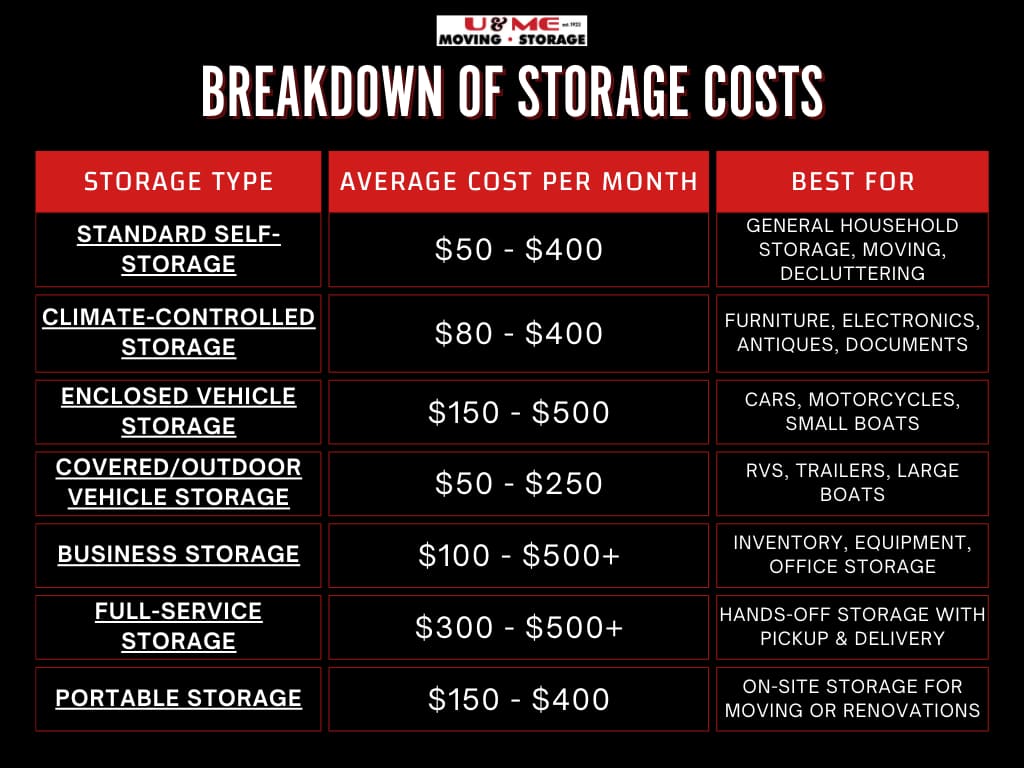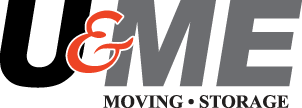Your Complete Guide to Storage Unit Prices in 2025

If you’re thinking about renting a storage unit in 2025, one of the first questions you’ll probably ask is: How much does it cost? Whether you need a small space for a few boxes or a larger unit for furniture and appliances, storage unit prices can vary based on several factors.
In this guide, we’ll break down what affects storage costs, what you can expect to pay, and how to find the best deal. We’ll also share some helpful tips to make sure you’re getting the most out of your storage rental.
How Much Does Storage Cost in 2025?
If you’re considering renting a storage unit, you might be wondering how much does storage cost. The cost of storage varies based on size, type, and special features. While a basic unit for household items may be relatively inexpensive, other storage options—like climate-controlled units or vehicle storage—can come at a higher price.
Here’s a breakdown of the different types of storage units available in 2025 and what you can expect to pay for each.
Types of Storage Units and Their Costs
Storage isn’t just for household items. There are many types of storage units, each designed for different needs. Whether you’re storing furniture, a vehicle, or even a boat, there’s an option to fit your situation.
1. Climate-Controlled Storage Units
Climate-controlled storage protects belongings from extreme temperatures and humidity, making it ideal for sensitive items.
- Cost: 20-50% more than a standard storage unit (typically $80 – $400/month, depending on size).
- Features: Temperature and humidity control, typically maintaining temperatures between 55-80°F.
- Best for storing:
- Wooden furniture
- Electronics & appliances
- Artwork, books, & documents
- Clothing, fabrics, & collectibles
Who should rent this?
- Anyone storing valuable or temperature-sensitive items
- Residents in hot or humid climates (like Florida)
- Those storing items long-term
2. Vehicle Storage Units
If you need to store a car, motorcycle, RV, or boat, there are several options:
Enclosed Vehicle Storage (Garage-Style Units)
- Cost: $150 – $500/month, depending on size
- Best for:
- Classic or luxury cars
- Motorcycles
- Small boats
- Jet skis
These units offer maximum protection against weather, theft, and vandalism.
Covered Vehicle Storage
- Cost: $75 – $250/month
- Best for:
- RVs & trailers
- Boats & personal watercraft
- Extra vehicles that don’t fit in a home garage
Covered storage provides some protection from sun and rain, but is not fully enclosed.
Outdoor Vehicle Storage
- Cost: $50 – $200/month
- Best for:
- Larger vehicles (RVs, trailers, work trucks)
- Boats & jet skis
- Budget-conscious storage seekers
Outdoor storage is the most affordable option, but it exposes vehicles to weather conditions.
Who should rent vehicle storage?
- Anyone with extra vehicles that don’t fit at home
- Seasonal travelers who need to store a vehicle while away
- Boat and RV owners looking for off-season storage
3. Business Storage Units
Many businesses rent storage units for extra inventory, supplies, or equipment.
- Small business storage (5’x10’ or 10’x10’): $100 – $200/month
- Larger units (10’x20’ or more): $200 – $500/month
- Warehouse-style storage: Prices vary, often over $500/month
Best for storing:
- Office furniture & supplies
- E-commerce inventory
- Tools & construction materials
- Important documents & records
Who should rent this?
- Business owners who need additional storage space
- Contractors and service professionals
- Retailers with excess inventory
4. Full-Service Storage (Pickup & Delivery)
Full-service storage facilities handle the transportation of your belongings.
- Cost: Starts at $300/month and can exceed $500/month depending on volume and services.
- Features:
- Pickup and delivery services
- Professional packing and handling
- Secure, climate-controlled storage
This is a great option for people who don’t want to move their belongings themselves or need long-term storage without hassle.
Who should rent this?
- Those moving to a new city or country
- People who need hands-off storage solutions
- Businesses storing high-value inventory
5. Portable Storage Units (On-Demand Storage)
Portable storage offers the convenience of having a storage container delivered to your home.
- Cost: Around $150 – $400 per month
- Features:
- Storage container is dropped off at your location
- You pack it at your own pace
- It can be stored on-site or transported to a facility
Best for:
- Home renovations (keeping furniture on-site)
- Temporary storage during a move
Businesses needing mobile storage
Who should rent this?
- Homeowners who want storage on their property
- Movers who need flexible, temporary storage
- Contractors who need on-site storage for tools and materials
Choosing the Right Storage for Your Needs
The type of storage unit you choose depends on what you’re storing, how long you need storage, and your budget.

If you’re looking for secure, affordable storage in Southeast Florida, U & Me Moving and Storage has a variety of options to fit your needs.
Need help choosing the right storage? Contact us today to get a quote!
Factors That Affect Storage Unit Prices
When looking for a storage unit, you might notice that prices can vary quite a bit. Some units cost as little as $50 a month, while others can run several hundred dollars. So, what makes the difference? Several key factors influence storage unit prices, and understanding them can help you find the best option for your budget and needs.
1. Size of the Unit
One of the biggest factors that determines the cost of a storage unit is its size. Naturally, larger units cost more than smaller ones because they offer more space.
- Small Units (5’x5’ or 5’x10’): Best for storing a few boxes, seasonal decorations, or small furniture like chairs and end tables.
- Medium Units (10’x10’ or 10’x15’): Ideal for storing the contents of a one- or two-bedroom apartment, including furniture and appliances.
- Large Units (10’x20’ or 10’x30’): Great for those moving out of a multi-bedroom home or needing to store business inventory, large furniture, or even a vehicle.
How do you choose the right size?
Consider how much you need to store and whether you’ll need access to your items. If you plan to retrieve things often, leaving a little extra space to walk around inside the unit can be helpful.
2. Location Matters
Where your storage unit is located plays a big role in how much it costs.
- Urban Areas: Storage units in big cities tend to be more expensive due to high demand and limited space.
- Suburban or Rural Areas: These locations generally offer lower prices because land is cheaper, and there are more facilities to choose from.
For example, a 10’x10’ unit in Miami might cost $180 per month, while the same unit in a smaller town could be $100 or less.
Does location matter if I don’t need frequent access to my unit?
If you don’t need to visit your storage unit often, it may be worth renting one in a lower-cost area a bit farther from your home.
3. Climate Control Costs More
Not all storage units are the same when it comes to protection from weather. Climate-controlled units maintain a consistent temperature and humidity level to prevent damage to sensitive items.
- Good for: Wooden furniture, electronics, artwork, musical instruments, photographs, and important documents.
- Costs more because: Climate-controlled units use additional energy to regulate temperature and humidity.
Do I need climate control?
If you’re storing items for a short time and live in a mild climate, a standard unit may be fine. But if you’re in a hot and humid area like Florida and storing items long-term, climate control is often worth the extra cost.
How Much Does Climate-Controlled Storage Cost?
At U & Me Moving and Storage, climate-controlled storage units typically range from $70 to $27 per month, making them about 17% more expensive than standard storage units. These units use air conditioning and heating to maintain stable temperatures, usually between 55 and 80 degrees Fahrenheit, helping to protect your belongings from extreme heat, cold, and humidity.
Renting a climate-controlled storage unit is a smart choice if you’re storing temperature-sensitive items like:
- Artwork & Antiques – Prevents warping, fading, or cracking.
- Clothing & Fabrics – Protects against mold and mildew.
- Books & Documents – Keeps pages from yellowing or deteriorating.
- Electronics & Appliances – Reduces the risk of damage from humidity and extreme temperatures.
If you’re storing your belongings long-term or live in a humid climate like Southeast Florida, investing in climate-controlled storage can help prevent costly damage and keep your valuables in top condition.
4. How Long You Rent It
Storage facilities typically offer month-to-month rentals, but committing to a longer-term lease can sometimes get you a discount.
- Short-term rentals (1-3 months): Ideal if you’re in the middle of a move or renovation.
- Long-term rentals (6+ months): Many storage companies offer lower monthly rates if you commit to renting for six months or a year.
Are there penalties for ending my rental early?
Some storage facilities may have fees if you prepay for a longer term and cancel early, so be sure to check the contract.
5. Security Features
Not all storage facilities offer the same level of security. Facilities with better security features tend to charge higher prices, but they provide extra peace of mind.
- Basic security: A fenced facility with a locked gate and security cameras.
- High-security features: 24/7 surveillance, individual unit alarms, gated access with personal entry codes, and on-site staff.
How do I know if a facility is secure?
Read customer reviews and visit in person to check for visible cameras, sturdy locks, and well-lit surroundings.
6. Extra Services
Some storage companies offer additional services to make storage more convenient, but these come at an added cost.
- Pickup & Delivery: Some companies provide full-service storage, meaning they’ll pick up your items, store them, and even deliver them back to you.
- Packing Supplies: Facilities may sell boxes, bubble wrap, and tape.
- Shelving & Organization: Some units allow shelving to maximize vertical space and keep items organized.
Are these extras worth the cost?
If you need convenience and have a busy schedule, full-service storage may be worth it. But if you’re comfortable moving and organizing things yourself, you can save money by handling it on your own.
7. Seasonal Demand
Believe it or not, the time of year can impact storage unit prices. Demand for storage tends to go up during certain seasons, which can drive prices higher.
- Peak season (Spring & Summer): More people move in the warmer months, causing storage unit prices to rise.
- Off-season (Fall & Winter): Fewer people move during these months, which may lead to discounts or promotional offers.
Is it better to rent during the off-season?
If you have flexibility, renting a unit in the fall or winter might save you money. Some facilities offer promotions like “first month free” during slower months.
Who Uses Storage Units?
Storage units serve a variety of needs, from personal storage to business solutions. Here’s a look at who commonly rents storage and why.
1. Homeowners & Renters
Many people use storage when they’re moving, decluttering, or just need extra space.
- Moving or Downsizing: Storage is useful when transitioning to a new home, downsizing, or waiting for a home sale to finalize.
- Home Renovations: Temporary storage keeps furniture and belongings safe during remodeling projects.
- Seasonal Storage: Items like holiday decorations, patio furniture, and winter clothing can be stored when not in use.
2. Businesses & Entrepreneurs
Companies, especially small businesses, benefit from storage units to manage inventory and equipment.
- Retail & E-Commerce: Business owners use storage for excess inventory, seasonal stock, and packaging supplies.
- Contractors & Service Professionals: Landscapers, electricians, and plumbers store tools, materials, and equipment securely.
- Office Storage: Businesses store documents, furniture, and promotional materials to free up office space.
3. College Students
Students often need temporary storage for their belongings between semesters.
- Summer Breaks: Instead of hauling everything home, students store dorm room essentials near campus.
- Study Abroad or Internships: A storage unit keeps belongings safe when students leave for extended periods.
4. Military Personnel
Active-duty service members use storage when deployed or reassigned.
- Deployment Storage: A secure unit protects personal belongings while stationed elsewhere.
- Frequent Relocations: Military families often store items between moves.
5. People Facing Life Transitions
Storage can provide peace of mind during major life changes.
- Divorce or Separation: A storage unit offers temporary space for personal items.
- Estate Settlements: Families use storage when managing an inherited estate.
- Temporary Relocation: Whether for work or personal reasons, storage helps keep belongings safe during a transition.
6. Long-Term Travelers & Expats
For those on the move, storage offers a convenient solution.
- Extended Travel: Travelers and digital nomads store furniture and valuables while abroad.
- Expats Living Overseas: Storage units provide a home for belongings until returning.
No matter the reason, storage units offer a flexible and secure way to keep belongings organized and protected.
Tips for Getting the Best Deal on Storage
If you want to save money while still getting a quality storage unit, here are some things to consider:
1. Compare Prices
Check multiple storage facilities in your area before deciding. Many list their prices online, so it’s easy to compare and find the best deal.
2. Look for Discounts
Storage companies often offer promotions like “first month free” or discounts for military members, students, or seniors.
3. Rent the Right Size
Don’t pay for more space than you actually need. If you’re storing boxes and small furniture, a compact unit may work just fine. Use vertical stacking to maximize space.
4. Consider the Timing
Storage costs tend to rise in the summer when more people are moving. If possible, rent during the off-season for lower prices.
5. Make Sure It’s Secure
A cheap storage unit isn’t worth it if your items aren’t safe. Read reviews and check what security features a facility offers before renting.
What’s Changing in Storage Prices for 2025?
The cost of storage is expected to change over time due to:
- More Demand for Climate-Controlled Units – As people store valuable and temperature-sensitive items, climate-controlled units are becoming more popular (and more expensive).
- Smart Storage Technology – Some facilities are adding app-based access, digital locks, and AI security monitoring, which could impact pricing.
- Rising Real Estate Prices – In cities where land and rent are getting more expensive, storage unit prices are likely to increase, too.
- Subscription-Based Pricing – Some companies are starting to offer flexible pricing models where you pay based on how often you access your unit.
Final Thoughts: Choosing the Right Storage Option
When looking for a storage unit, it’s important to balance cost with security, convenience, and space. Whether you need short-term storage during a move or long-term storage for valuable belongings, knowing the factors that affect storage unit prices will help you make the best decision.
If you’re looking for a trusted storage provider in Southeast Florida, U & Me Moving and Storage has secure, affordable options to fit your needs. Contact us today for a free quote!



